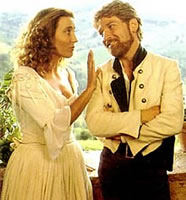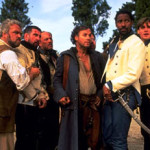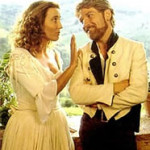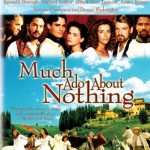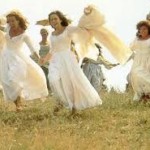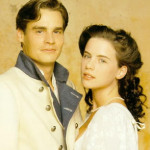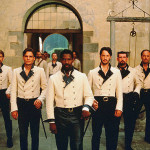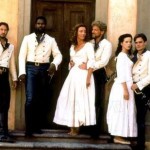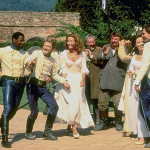As the title suggests, this Shakespearean rom-com is a matter of little consequence, a puffed-up ball of fluff, wordy stuff and nonsense, a candy floss, mere ephemera. Lacking the weighty underpinnings of his more serious plays, each of which includes welcome notes of humour (the gravedigger scene in Hamlet, for example), Much Ado About Nothing depends for its humour and entertainment value on misunderstandings, scheming, dazzling verbal jousting, heroes and villains, and mistaken identity, placing in the modern context somewhere between a French farce and a pantomime, with the odd darker twist here and there.
The 1993 movie of Much Ado comes from the era when Kenneth Branagh was hoping to emulate Olivier in bringing definitive versions of the bard’s works to screen as actor-manager-director of his own repertory company, including his then wife, Emma Thompson.
To be fair, Branagh made a very decent stab at the works of Shakespeare, pulling off not just MAAN but also fresh interpretations of Henry V, Love’s Labours Lost, Hamlet, Othello (playing Iago but ceding direction to Oliver Parker) and latterly As You Like It before finally playing his hero in My Week With Marilyn.
It takes some balls to take on roles delivered on screen with the authority of Olivier, and Branagh has them. He is unquestionably a fine actor, though whether his achievements will ever be spoken of in the same breath as those of the maestro remains to be seen.
Here he jousts with Thompson and comes off slightly the worse, certainly the hammier. Perhaps this is evidence that her Oscar for Howards End was not an accident and that her honours rankle slightly with Branagh, though it would be churlish to be over-critical – he does bring Benedick to life with a deep-seated sense of moral indignation in a way many a Shakespearean actor has failed to do. It is credit to his direction that acting honours for the movie undoubtedly go to Thompson. Her faultless and effortless mastery of Iambic Pentameter is a joy to behold and true poetry throughout, while speaking her mind as clearly as I speak to you. For an amateur actor, this is wonderful to see and as good as it gets.
You certainly can’t fault Branagh’s ability to attract a top class cast and extract from them excellent performances either. They are topped with a smattering of American talent to keep the studio bosses happy; Denzel Washington takes to his role as Don Pedro like the proverbial duck to water, while Keanu Reeves as the sour-faced and evil Don John does his level best to cackle like an old hag as he plays the pantomime villain.
As one of the two romantic leads (Branagh playing Benedick to his Claudio), a very young Robert Sean Leonard looks pretty and sounds a wee bit preppy, but handles his role well. It’s not his fault that I can only see him as Dr Wilson from House! As for Michael Keaton‘s alleged comic turn as Dogberry the constable, complete with turgid malapropisms, possibly the less said the better.
But look around and you’ll see lots of wonderful British talent, not least the recently deceased Richard Briers, Brian Blessed, Imelda Staunton, Thompson’s mother Phyllida Law, and a young Kate Beckinsale as the heroine Hero (dumb name to choose, Will!)
It is only when you see Briers in roles such as this that you realise just how versatile he could be. True, his Leonato has many of the same kindly characteristics of Tom Good in The Good Life, but the thought of his beloved daughter Hero turning anti-heroine brings out the dark side of Governor Leonato in a speech of bitter, burning intensity. Would that we had seem more of the dark side of Briers over the years.
The other starring role worthy of a mention is the Italian countryside and the beautiful old villa against which the action is transposed. The movie, its actors and its costumes looks glorious and ravishing from first moment to last, and it even sounds good thanks to a soundtrack written specially by another long-time Branagh collaborator, Patrick Doyle.
Taken in isolation, you could complain neither of lack of clarity nor of lack of entertainment value. Shakespeare-lite it may be to some, but you can’t blame Branagh for giving the play a bit of oomph and screen-worthiness along the way.

